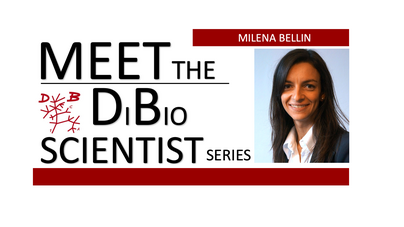
MEET THE DIBIO SCIENTIST SERIES : MILENA BELLIN
Pubblicato il: 17.11.2020 19:00
Milena has been recently appointed as a tenure-track researcher (RTDb) at DiBio
Can you summarize in few words your research?
I use human pluripotent stem cells to study inherited cardiac disorders. Diseases of the heart rhythm often cause sudden death even in young individuals and a lot of research is needed to understand the genetic, molecular, and electrical mechanisms causing the heart not to beat properly. It is very difficult and risky to take beating cells from the heart of a patient, but turning blood or skin cells into pluripotent stem cells allows us to have an unlimited source for generating heart cells with the patient’s genetic makeup.
What is the most rewarding and the most challenging part of your work?
The most rewarding part of my work is to be able to take a small sample of blood or a small skin biopsy from a patient and turn these cells into “beating cells of the heart” in a dish. Looking through the microscope and seeing these cells contracting, this gives me energy and enthusiasm in pursuing my research. The most challenging part is to look for funds to support my research.
Tell us your story: what brings you to DiBio?
I studied Biological Sciences in Padova and I did a PhD in Genetics and Molecular Biology of the Development at the DiBio. After that, to complement my knowledge in human genetics with stem cell skills, I moved to Munich (Germany) for 3 years. I was then awarded a Marie Curie fellowship and moved to Leiden (The Netherlands), where I developed as independent principal investigator, running a group of 5 talented researchers, which I am still leading from Padova. I am honoured of having had the opportunity to return to DiBio, where my ambition is to transfer my knowledge developed in 10 years abroad. The recently awarded intramural research grant PRID from DiBio will allow me to start my group here.
What’s your favourite “toy” for research – and what can it do?
I have two. “Human mini-hearts” from stem cells, which are beating spheroids made of different cells of the heart (muscle, vessel and stromal cells) and which I have recently developed with my team in Leiden. And CRISPR/Cas technology, which makes it possible to genetically modify human stem cells without the very laborious process of building large DNA molecules.
What are your interests outside science?
I love skiing, cooking and travelling, but since a couple of years my free time is mainly dedicated to my two lively kids.





